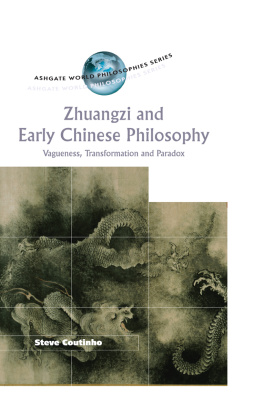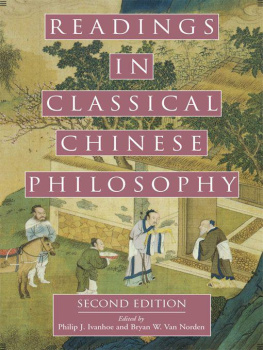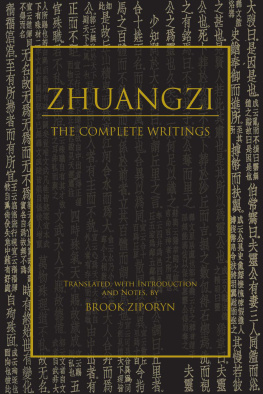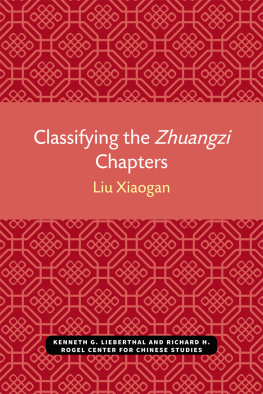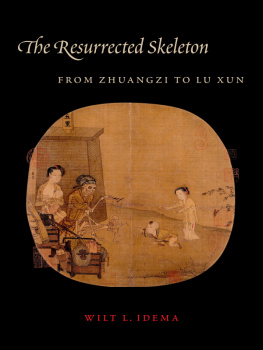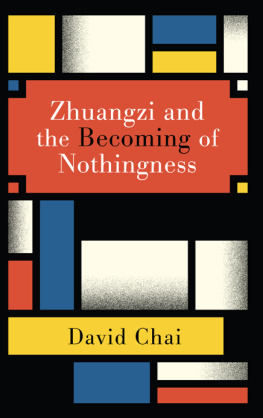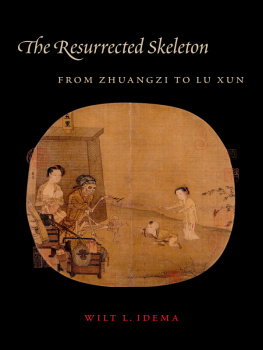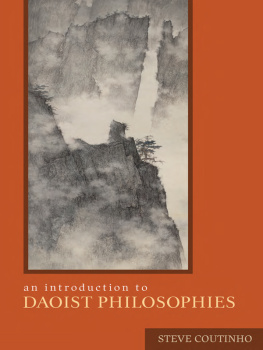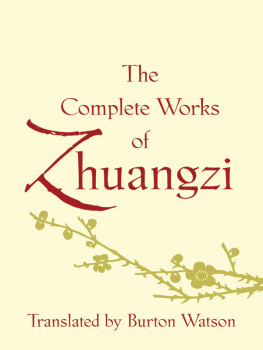Steve Coutinho - Zhuangzi and Early Chinese Philosophy: Vagueness, Transformation and Paradox
Here you can read online Steve Coutinho - Zhuangzi and Early Chinese Philosophy: Vagueness, Transformation and Paradox full text of the book (entire story) in english for free. Download pdf and epub, get meaning, cover and reviews about this ebook. year: 2004, publisher: Ashgate, genre: Science. Description of the work, (preface) as well as reviews are available. Best literature library LitArk.com created for fans of good reading and offers a wide selection of genres:
Romance novel
Science fiction
Adventure
Detective
Science
History
Home and family
Prose
Art
Politics
Computer
Non-fiction
Religion
Business
Children
Humor
Choose a favorite category and find really read worthwhile books. Enjoy immersion in the world of imagination, feel the emotions of the characters or learn something new for yourself, make an fascinating discovery.
- Book:Zhuangzi and Early Chinese Philosophy: Vagueness, Transformation and Paradox
- Author:
- Publisher:Ashgate
- Genre:
- Year:2004
- Rating:4 / 5
- Favourites:Add to favourites
- Your mark:
- 80
- 1
- 2
- 3
- 4
- 5
Zhuangzi and Early Chinese Philosophy: Vagueness, Transformation and Paradox: summary, description and annotation
We offer to read an annotation, description, summary or preface (depends on what the author of the book "Zhuangzi and Early Chinese Philosophy: Vagueness, Transformation and Paradox" wrote himself). If you haven't found the necessary information about the book — write in the comments, we will try to find it.
Steve Coutinho: author's other books
Who wrote Zhuangzi and Early Chinese Philosophy: Vagueness, Transformation and Paradox? Find out the surname, the name of the author of the book and a list of all author's works by series.
Zhuangzi and Early Chinese Philosophy: Vagueness, Transformation and Paradox — read online for free the complete book (whole text) full work
Below is the text of the book, divided by pages. System saving the place of the last page read, allows you to conveniently read the book "Zhuangzi and Early Chinese Philosophy: Vagueness, Transformation and Paradox" online for free, without having to search again every time where you left off. Put a bookmark, and you can go to the page where you finished reading at any time.
Font size:
Interval:
Bookmark:

ZHUANGZI AND EARLY CHINESE PHILOSOPHY
This is comparative philosophy at its best. It is an object lesson in its own thesis, challenging the closure of exclusive interpretive judgments with the ingenuity of more productive, insights and discernments. From the purchase of a range of familiar Western interpretive strategies, Coutinho goes beyond dichotomy to promote a third position: penumbral thinking. In a word, penumbral thinking is an attempt to exploit the always attendant indeterminacy that honeycombs determinate vocabularies as an open and bottomless source of increased meaning.
-Roger T. Ames, Professor of Philosophy,
University of Hawaii
The Daoist philosopher Zhuangzi (also known as Chuang Tzu), along with Confucius, Lao Tzu, and the Buddha, ranks among the most influential thinkers in the development of East Asian thought. His literary style is humorous and entertaining, yet the philosophical content is extraordinarily subtle and profound.
This book introduces key topics in early Daoist philosophy. Drawing on several issues and methods in Western philosophy, from analytical philosophy to semiotics and hermeneutics, the author throws new light on the ancient Zhuangzi text. Engaging Daoism and contemporary Western philosophical logic, and drawing on new developments in our understanding of early Chinese culture, Coutinho challenges the interpretation of Zhuangzi as either a skeptic or a relativist, and instead seeks to explore his philosophy as emphasizing the ineradicable vagueness of language, thought and reality.
This new interpretation of the Zhuangzi offers an important development in the understanding of Daoist philosophy, describing a world in flux in which things themselves are vague and inconsistent, and tries to show us a Way (a Dao) to negotiate through the shadows of a chaotic world.
Ashgate World Philosophy Series
The Ashgate World Philosophies Series responds to the remarkable growth of interest among English-language readers in recent years in philosophical traditions outside those of the West. The traditions of Indian, Chinese, and Japanese thought, as well as those of the Islamic world, Latin America, Africa, Aboriginal Australian, Pacific and American Indian peoples, are all attracting lively attention from professional philosophers and students alike, and this new Ashgate series provides introductions to these traditions as well as in-depth research into central issues and themes within those traditions. The series is particularly designed for readers whose interests are not adequately addressed by general surveys of World Philosophy, and it includes accessible, yet research-led, texts for wider readership and upper-level student use, as well as research monographs. The series embraces a wide variety of titles ranging from introductions on particular world philosophies and informed surveys of the philosophical contributions of geographical regions, to in-depth discussion of a theme, topic, problem or movement and critical appraisals of individual thinkers or schools of thinkers.
Series Editors:
David E. Cooper, University of Durham, UK
Robert C. Solomon, University of Texas, Austin, USA
Kathleen M. Higgins, University of Texas, Austin, USA
Purushottama Bilimoria, Deakin University, Australia
Other titles in the series:
Buddhism, Knowledge and Liberation
A Philosophical Study
David Burton
Zen Buddhism and Environmental Ethics
Simon P. James
Comparative Approaches to Chinese Philosophy
Edited by Bo Mou
An Introduction to Yoga Philosophy
An annotated translation of the Yoga Sutras
Ashok Kumar Malhotra
Zhuangzi and Early Chinese Philosophy
Vagueness, Transformation and Paradox
STEVE COUTINHO
Towson University, Maryland, USA

First published 2004 by Ashgate Publishing
Published 2016 by Routledge
2 Park Square, Milton Park, Abingdon, Oxon OX14 4RN
711 Third Avenue, New York, NY 10017, USA
Routledge is an imprint of the Taylor & Francis Group, an informa business
Copyright Steve Coutinho 2004
The author has asserted his moral right under the Copyright, Designs and Patents Act, 1988, to be identified as the author of this work.
All rights reserved. No part of this book may be reprinted or reproduced or utilised in any form or by any electronic, mechanical, or other means, now known or hereafter invented, including photocopying and recording, or in any information storage or retrieval system, without permission in writing from the publishers.
Notice:
Product or corporate names may be trademarks or registered trademarks, and are used only for identification and explanation without intent to infringe.
British Library Cataloguing in Publication Data
Coutinho, Steve
Zhuangzi and early Chinese philosophy : vagueness, transformation and paradox. (Ashgate world philosophies series)
1. Zhuang zi
I. Title
181.1'14
Library of Congress Cataloging-in-Publication Data
Coutinho, Steve, 1963
Zhuangzi and early Chinese philosophy: vagueness transformation and paradox / Steve Coutinho. 1st ed.
p. cm. (Ashgate world philosophies series)
Includes bibliographical references and index.
ISBN 0-7546-3730-1 (alk. paper)
1. Zhuangzi. Nan hua jing. 2. Philosophy, Taoist. 3. Philosophy, Chinese. I. Title. II. Series.
BL1900.C576C68 2004
181'. 114dc22
2004011994
ISBN 13: 978-0-7546-3730-1 (hbk)
from western Zhou to Qin and Han, China followed a winding course of development. The more than five centuries of the eastern Zhou era were the longest period of disunion in the whole of Chinese history, but China did not dissolve into separate entities, and no insurmountable barriers or fences separated the various states of lords. The intercommunication and movement of people, the merging and diffusion of cultures, and the strategic activities, allegiances, and subjugations of the rulersthese enabled the whole of China to maintain organic ties among its parts, as in a game of go.
Li Xueqin, Eastern Zhou and Qin Civilizations.
Contents
There is growing interest among experts and amateurs, Sinologists and Sinophiles alike, in the philosophy of the ancient Daoist thinker Zhuangzi (also known as Chuang Tzu). This book, I sincerely hope, will have something of interest to say to both. It is my firm belief that philosophy, no matter how rarified and technical, should make every attempt to communicate outside the walls of its discipline, and that, if worthwhile, it should make a difference to peoples lives. The reader who browses casually through this book will notice unfamiliar signs, logical symbols and Chinese characters. These are technical details included solely for the convenience and benefit of scholars, and for those who read Chinese. They should not pose a serious obstacle for the general reader, but hopefully will pique their curiosity.
Western academia is in crisis. Post-colonial disillusionment with an imperialist past has led to a widespread rejection of the traditional ideals of rationality, truth, and progress. It is commonly thought that if one does not embrace a radical scepticism or relativism, then one must be an absolutist with imperialist designs. I do not accept the terms of this dichotomy. The extremists on both sides, I believe, have overlooked a pragmatic middle ground: one that rejects foundations without being nihilistic, and that accepts plurality without being relativistic. Such a position tends to be too radical for the conservatives, and also too conservative for the radicals. Perhaps if they abandon their dichotomous modes of judgment, they will be able to appreciate the value of the middle ground.
Font size:
Interval:
Bookmark:
Similar books «Zhuangzi and Early Chinese Philosophy: Vagueness, Transformation and Paradox»
Look at similar books to Zhuangzi and Early Chinese Philosophy: Vagueness, Transformation and Paradox. We have selected literature similar in name and meaning in the hope of providing readers with more options to find new, interesting, not yet read works.
Discussion, reviews of the book Zhuangzi and Early Chinese Philosophy: Vagueness, Transformation and Paradox and just readers' own opinions. Leave your comments, write what you think about the work, its meaning or the main characters. Specify what exactly you liked and what you didn't like, and why you think so.

